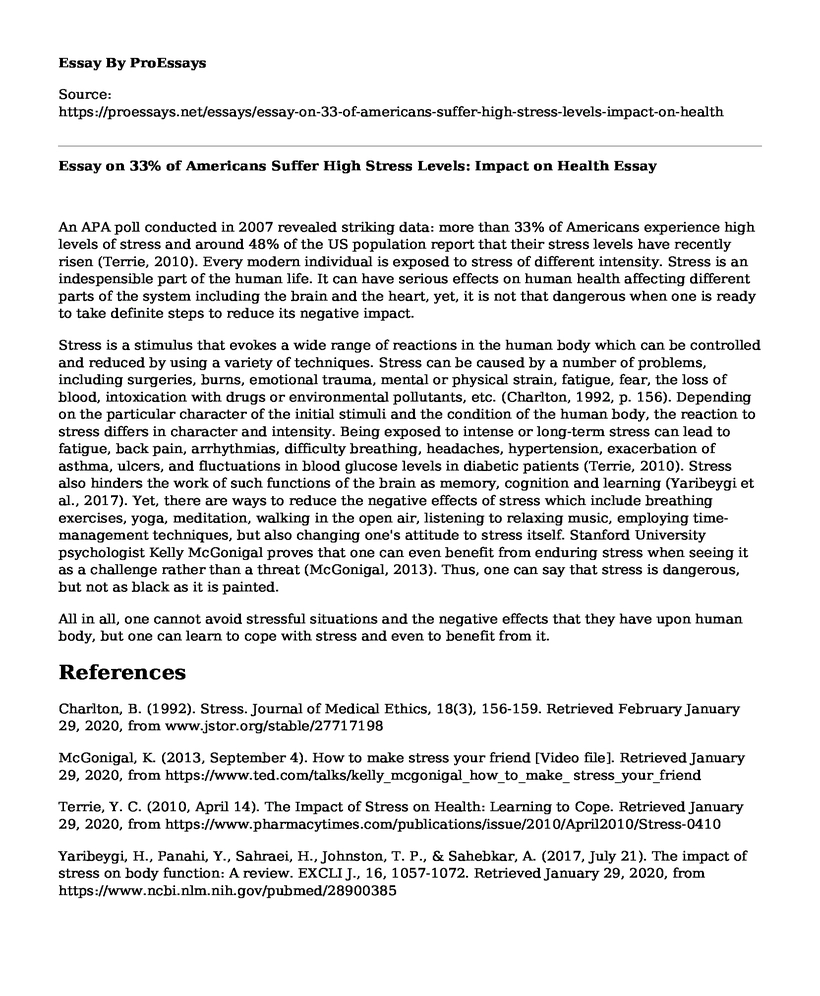An APA poll conducted in 2007 revealed striking data: more than 33% of Americans experience high levels of stress and around 48% of the US population report that their stress levels have recently risen (Terrie, 2010). Every modern individual is exposed to stress of different intensity. Stress is an indespensible part of the human life. It can have serious effects on human health affecting different parts of the system including the brain and the heart, yet, it is not that dangerous when one is ready to take definite steps to reduce its negative impact.
Stress is a stimulus that evokes a wide range of reactions in the human body which can be controlled and reduced by using a variety of techniques. Stress can be caused by a number of problems, including surgeries, burns, emotional trauma, mental or physical strain, fatigue, fear, the loss of blood, intoxication with drugs or environmental pollutants, etc. (Charlton, 1992, p. 156). Depending on the particular character of the initial stimuli and the condition of the human body, the reaction to stress differs in character and intensity. Being exposed to intense or long-term stress can lead to fatigue, back pain, arrhythmias, difficulty breathing, headaches, hypertension, exacerbation of asthma, ulcers, and fluctuations in blood glucose levels in diabetic patients (Terrie, 2010). Stress also hinders the work of such functions of the brain as memory, cognition and learning (Yaribeygi et al., 2017). Yet, there are ways to reduce the negative effects of stress which include breathing exercises, yoga, meditation, walking in the open air, listening to relaxing music, employing time-management techniques, but also changing one's attitude to stress itself. Stanford University psychologist Kelly McGonigal proves that one can even benefit from enduring stress when seeing it as a challenge rather than a threat (McGonigal, 2013). Thus, one can say that stress is dangerous, but not as black as it is painted.
All in all, one cannot avoid stressful situations and the negative effects that they have upon human body, but one can learn to cope with stress and even to benefit from it.
References
Charlton, B. (1992). Stress. Journal of Medical Ethics, 18(3), 156-159. Retrieved February January 29, 2020, from www.jstor.org/stable/27717198
McGonigal, K. (2013, September 4). How to make stress your friend [Video file]. Retrieved January 29, 2020, from https://www.ted.com/talks/kelly_mcgonigal_how_to_make_ stress_your_friend
Terrie, Y. C. (2010, April 14). The Impact of Stress on Health: Learning to Cope. Retrieved January 29, 2020, from https://www.pharmacytimes.com/publications/issue/2010/April2010/Stress-0410
Yaribeygi, H., Panahi, Y., Sahraei, H., Johnston, T. P., & Sahebkar, A. (2017, July 21). The impact of stress on body function: A review. EXCLI J., 16, 1057-1072. Retrieved January 29, 2020, from https://www.ncbi.nlm.nih.gov/pubmed/28900385
Cite this page
Essay on 33% of Americans Suffer High Stress Levels: Impact on Health. (2023, Mar 27). Retrieved from https://proessays.net/essays/essay-on-33-of-americans-suffer-high-stress-levels-impact-on-health
If you are the original author of this essay and no longer wish to have it published on the ProEssays website, please click below to request its removal:
- Paper Sample on Need and History of Affordable Care Act
- Otitis Externa Paper Example
- Pathophysiology of Emphysema Paper Example
- Nature and Scope of Social Anxiety Disorder Paper Example
- Essay Sample on Love and Hatred: Significant Factors in an Individual's Life
- Coronavirus Outbreak: California's Fiscal & Policy Challenges - Essay Sample
- Essay Sample on Sickle Cell Disease: Unveiling the Genetic Factor and Health Disparities







